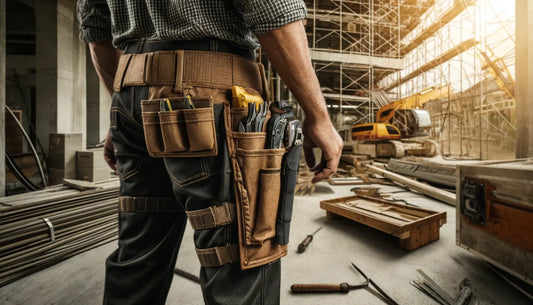
Does Your Van Insurance Actually Cover Stolen Tools?
For tradespeople, tools aren’t just possessions; they’re the core of your business. Without them, even the most skilled professional is unable to work, and a single theft incident can lead to financial strain and missed opportunities. Unfortunately, standard van insurance often doesn’t provide sufficient cover for these essential items.
This guide clarifies why your van insurance may or may not cover stolen tools, the role of separate tool insurance, and the concrete steps you can take to protect your livelihood.
1. The Reality of Van Insurance vs. Tool Insurance
Many tradesmen assume that because they’ve insured their van, they’ve also insured everything inside it. In practice, it’s rarely that straightforward. Standard van insurance typically covers damage to or theft of the vehicle itself—but often offers minimal or no cover for specialist tools.
Quick Comparison
| Coverage Aspect | Standard Van Insurance | Dedicated Tool Insurance |
|---|---|---|
| Main Purpose | Covers damage/theft of the vehicle | Covers loss, theft, or damage to tools, whether in transit or on-site |
| Coverage Limits for Tools | Low or nonexistent | Higher (often up to full replacement value) |
| Typical Exclusions | Tools left in unattended vehicles overnight | Some policies exclude unlocked vans or specific job-site conditions |
| Customisation | Limited (vehicle-focused) | Tailored to individual trades; can include accidental damage, overnight cover, etc. |
| Claim Eligibility Requirements | Vehicle damage/theft must meet policy conditions | May require receipts, proof of secure storage, forced-entry evidence |
Key Takeaway: Standard van insurance alone is usually insufficient to cover all of your valuable tools. You’ll likely need additional coverage specifically geared towards equipment protection.
2. Understanding Why Tools Often Aren’t Covered
Vehicle-Centric Policy
Van insurance is designed primarily to protect against liabilities related to driving. Whether it’s an accident on the road or damage due to vandalism, the focus is on the van itself. Anything you transport—furniture, goods, or tools—generally receives only partial or incidental coverage.
Claim Limits and Add-Ons
If your van insurance does have a contents add-on, be aware that:
- Claim limits can be very low compared to the typical value of professional tools.
- Policy conditions (e.g., locked storage, overnight restrictions) might render coverage void if not followed precisely.
Industry Insight: According to a Federation of Master Builders (FMB) survey, 83% of tradespeople consider their tools to be their most valuable asset. Nonetheless, many remain underinsured because they assume van coverage automatically extends to these tools.
3. What Is Tool Insurance?
Tool insurance (often referred to as tools-in-transit insurance) is coverage specifically designed to protect your work equipment from:
- Theft: Stolen from your van, job site, or locked premises
- Accidental Damage: Damage on-site or during transit
- Fire/Flood: Destruction caused by natural or accidental disasters
Common Features of Dedicated Tool Insurance
| Feature | Description |
|---|---|
| New-for-Old Replacement | Replaces stolen or damaged tools with brand-new equivalents rather than a depreciated value |
| High or Customisable Limits | Covers the total value of your equipment, avoiding underinsurance |
| Flexible Overnight Cover | Some policies allow tools to remain in locked vans overnight, provided certain security measures apply |
| Worldwide Coverage | Optional coverage for tradesmen working internationally |
Reference: Checkatrade’s blog on tool insurance underscores how specialised policies can alleviate the financial burden when costly tools are stolen or damaged—a frequent issue in the UK’s building and renovation sectors.
4. The Financial Impact of Tool Theft
Tool theft is a growing problem, with a recent spike in incidents reported by sources like The Guardian and The Construction Index. Here’s why it’s such a major concern:
- High Value of Tools: Even a basic set of power tools for carpentry or electrical work can easily exceed £5,000 in total value.
- Lost Income: If you don’t have your tools, you can’t take on jobs—leading to lost earnings and potentially damaged reputation if deadlines are missed.
- Replacement Costs: Replacing tools out of pocket is financially draining. Without proper insurance, a single theft incident can set you back thousands.
5. Real-Life Case Study: Mark’s Plumber’s Van Break-In
Mark, a plumber from Manchester, had his van broken into late one evening. Thieves made off with over £5,000 worth of specialised plumbing tools.
- Van Insurance: Provided no cover for contents (he only had standard vehicle coverage).
- Separate Tool Insurance: He had opted for a dedicated policy with “new-for-old” replacement.
Outcome: Mark was able to claim the full value of his equipment. While the break-in was a serious hassle, the dedicated tool cover meant he wasn’t forced to dip into personal savings—or worse, take out a loan—to replace everything.
6. Factors That Influence Tool Insurance Claims
When filing a claim for stolen or damaged tools, insurers often look for:
-
Security Measures
- Proof of heavy-duty locks, alarm systems, or secure parking locations.
- Some policies require reinforced toolboxes or steel cage units within the van.
-
Timing/Location of Theft
- Overnight theft might not be covered if tools weren’t removed from the vehicle or locked in a secure building (depending on the policy).
- Job-site theft can require evidence of forced entry or lock tampering.
-
Documentation & Proof of Ownership
- Insurers typically ask for purchase receipts, serial numbers, or photos.
- Maintaining a digital inventory can streamline the claim process.
-
Compliance with Policy Conditions
- You might need to prove “forced entry” if the van wasn’t obviously damaged.
- Some policies exclude coverage if you left doors unlocked or windows open, even briefly.
7. Common Exclusions to Watch Out For
Even the best tool insurance policies can have exclusions. A few typical scenarios include:
- Unattended Vehicles: Coverage may be void if tools are left in an unlocked or unattended van overnight, unless explicitly allowed by the policy.
- Wear and Tear: Gradual deterioration or normal wear and tear are generally not claimable.
- No Signs of Forced Entry: If a thief manages to open your van without leaving visible damage, certain insurers may reject the claim.
- Poor Security Measures: If you can’t demonstrate basic security (locks, alarm systems, secure parking), some claims may be denied.
8. Practical Ways to Protect Your Tools
While insurance offers financial backup, prevention is always better than cure. Consider these proven strategies:
8.1 Van Security Upgrades
| Method | Why It Helps |
|---|---|
| Upgraded Locks & Alarms | Reinforced locks and a loud alarm system deter criminals, making break-ins more difficult. |
| Reinforced Storage | Installing secure steel cages or lockable tool chests adds another layer of protection. |
| Visible Deterrents | Stickers warning of CCTV or tracking devices can discourage opportunistic theft. |
8.2 Secure Parking
- Choose Well-Lit Areas: Thieves prefer darkness; bright lighting or monitored car parks reduce risks.
- Park Smartly: Ideally close to walls, fences, or other vehicles to limit access to side doors.
8.3 Inventory Management
- Digital Record Keeping: Take photos of each tool, note model numbers, and store purchase receipts in the cloud.
- Marking/Branding Tools: Engraving your name or business details makes tools less attractive to thieves and easier to reclaim if found.
9. Steps to Take Immediately After a Theft
If you discover that your van has been broken into and tools stolen:
-
Contact the Police
- File a report and obtain a crime reference number (essential for insurance claims).
- UK Government’s guide on reporting crime: Report Crime - GOV.UK.
-
Notify Your Insurer
- Provide the crime reference number, photos of damage, and evidence of forced entry.
- Give them your inventory list, proof of ownership, and any relevant receipts.
-
Document the Scene
- Photograph the break-in damage, locks, and surrounding area. More evidence can support your claim.
-
Begin Replacement Process
- Depending on your policy, you may receive a lump-sum payout or direct tool replacements.
- Keep all correspondence for your records.
10. Steps to Ensure You’re Properly Covered
10.1 Review Your Current Van Insurance
- Check Coverage Details: Read the fine print on contents cover, if it exists.
- Claim Limits & Exclusions: Assess whether any tool cover included is adequate for high-value or specialist equipment.
10.2 Consider a Dedicated Tool Insurance Policy
- Compare Providers: CompareTheMarket, Direct Line, or Simply Business are popular comparison sites/insurers.
- Check Customer Reviews: Real-world feedback can highlight how straightforward the claim process is.
- Look for Key Features: “New-for-old” replacement, overnight theft cover, and flexible coverage limits.
10.3 Maintain Proper Security
- Follow Policy Requirements: If your policy states tools must be locked away or removed at night, adhere to it strictly.
- Keep an Updated Inventory: Regularly audit and photograph new or upgraded tools.
11. Related Reading and Resources
- Federation of Master Builders (FMB) – Trade body offering best-practice guides for builders and related trades
- Checkatrade Blog – Advice on insurance and security for various trades
- UK Government: Vehicle Insurance – Official regulations on vehicle insurance in the UK
- Direct Line for Business – Articles on van and tool security, plus coverage options
- Tauro Workwear – Practical, durable workwear solutions to protect you and your team on-site
12. Conclusion: Protect Your Tools—and Your Livelihood
Van insurance alone often falls short in covering your valuable tools, leaving you vulnerable to hefty financial losses if your vehicle is broken into. By understanding policy limitations and taking proactive steps—such as investing in dedicated tool insurance, upgrading security measures, and keeping an updated digital inventory—you can keep your business running smoothly even in the face of theft or damage.
Final Advice: Don’t assume you’re fully covered just because you have van insurance. Take the time to explore and compare tool insurance policies from reputable providers. A small investment today can save you enormous stress, expense, and lost income in the future.
Looking for More Tips on Safeguarding Your Work?
- Tools Insurance Cost Guide – A deeper look into tool insurance pricing and how to reduce premiums
- Top Security Measures for Tradesmen – Detailed advice on locks, alarms, CCTV, and more
- High-Quality Workwear from Tauro – Hard-wearing clothes to protect you on-site
Stay secure, stay informed, and ensure you’ve got the right coverage for your invaluable tools.
- Home
- >
- The Workwear Edit
- >
- Does Your Van Insurance Actually Cover Stolen Tools?
Let customers speak for us
from 9 reviewsFelt like batman when I put these bad boys on, pockets everywhere and they fit perfectly. Best pair of work trousers I’ve had in a while
Bought these trousers a while back and been genuinely impressed with them. Held up well on site and look decent as well. Will defo pick up another pair soon.
Every time I wear them at work, I feel protected and ready for anything. The reinforced knee pockets are perfect when I’m kneeling on rough surfaces, and the removable holster pockets are so handy for carrying tools. The stretch fabric makes moving around very easy, and I do not feel constricted at all. The elastic waistband is super comfortable all day. I’ve tried bigger brands before, but these pants blow them out of the water. Honestly, I didn’t expect them to be this good, very impressed with the quality and fit.
Extremely good quality work trousers.Fit is perfect and there extremely well made. Plenty of pockets to store,tool screws etc.




